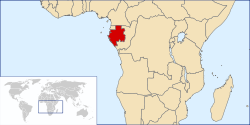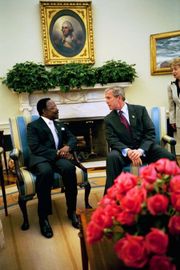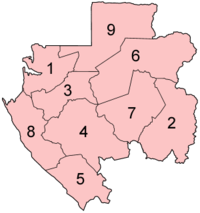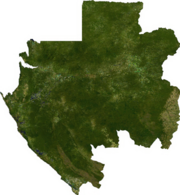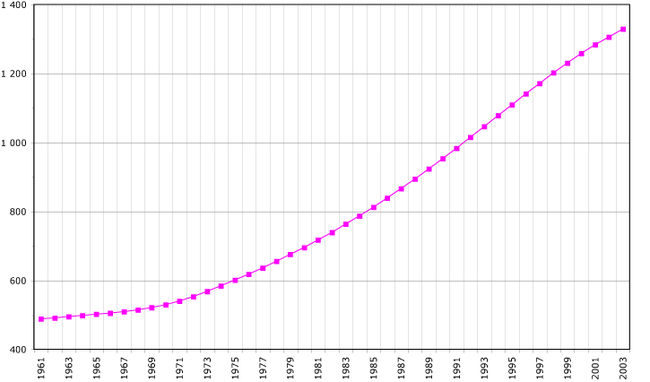Gabon
2008/9 Schools Wikipedia Selection. Related subjects: Africa; African Countries
| République Gabonaise Gabonese Republic
|
||||||
|---|---|---|---|---|---|---|
|
||||||
| Anthem: La Concorde |
||||||
|
|
||||||
| Capital (and largest city) |
Libreville |
|||||
| Official languages | French | |||||
| Demonym | Gabonese | |||||
| Government | Republic | |||||
| - | President | Omar Bongo | ||||
| - | Prime Minister | Jean Eyeghe Ndong | ||||
| Independence | ||||||
| - | from France | August 17, 1960 | ||||
| Area | ||||||
| - | Total | 267,668 km² 103,347 sq mi |
||||
| - | Water (%) | 3.76% | ||||
| Population | ||||||
| - | July 2005 estimate | 1,454,867 ( 150th) | ||||
| - | Density | 5.4/km² ( 216th) 13.5/sq mi |
||||
| GDP ( PPP) | 2007 estimate | |||||
| - | Total | $9.621 billion ( 136th) | ||||
| - | Per capita | $14,083 ( 53rd) | ||||
| HDI (2007) | ▲ 0.677 (medium) ( 119th) | |||||
| Currency | CFA franc ( XAF) |
|||||
| Time zone | WAT ( UTC+1) | |||||
| - | Summer ( DST) | not observed ( UTC+1) | ||||
| Internet TLD | .ga | |||||
| Calling code | +241 | |||||
Gabon (pronounced /gəˈbɒn/ or /gaˈbõ/ in French) is a country in west central Africa sharing borders with Equatorial Guinea, Cameroon, Republic of the Congo and the Gulf of Guinea. The capital and largest city is Libreville. Since its independence from France on August 17, 1960, the Republic has been ruled by four presidents. In the early 1990s, Gabon introduced a multi party system and a new democratic constitution that allowed for a more transparent electoral process and reformed many governmental institutions. A small population (less than two million), abundant natural resources, and foreign private investment have helped make Gabon one of the most prosperous countries in the region, with the highest HDI in Sub-Saharan Africa.
History
The earliest inhabitants of the area were Pygmy peoples. They were largely replaced and absorbed by Bantu tribes as they migrated.
In the 15th century, the first Europeans arrived. The nation's name originates from these days as 'Gabão' is Portuguese for cabin, which is roughly the shape of the estuary of the Komo River by Libreville. French explorer Pierre Savorgnan de Brazza led his first mission to the Gabon-Congo area in 1875. He founded the town of Franceville, and was later colonial governor. Several Bantu groups lived in the area that is now Gabon when France officially occupied it in 1885.
In 1910, Gabon became one of the four territories of French Equatorial Africa, a federation that survived until 1959. These territories became independent on August 17, 1960. The first president of Gabon, elected in 1961, was Léon M’ba, with Omar Bongo Ondimba as his vice president. When M'Ba died in 1967, Bongo replaced him as president, and has been the head of state ever since, winning each contested election with a substantial majority.
Government
In March of 1991, a new constitution was enacted. Among its provisions are a bill of rights, the creation of a body to guarantee those rights ( National Council of Democracy) and a governmental advisory board which deals with economic and social issues. Multi-party legislative elections were held in 1990-91 even though opposition parties had not yet been formally declared legal.
President El Hadj Omar Bongo Ondimba, in power since 1967 , was re-elected to his third consecutive seven-year term on November 27, 2005. According to figures provided by Gabon's Interior Ministry, he received a 79.1% majority of votes. Voting age in Gabon is 21 years of age. In 2003, the President amended the Constitution of Gabon to remove any restrictions on the number of terms a president is allowed to serve. The president retains strong powers, such as authority to dissolve the National Assembly, declare a state of siege, delay legislation, conduct referendums, and appoint or dismiss the prime minister as well as cabinet members. In provisional results, the ruling Gabonese Democratic Party (PDG) won 84 out of 120 parliamentary seats.
As with previous Gabonese elections, the opposition parties have contested the results. There were calls for a boycott and accusations of electoral fraud and bribery. There were also incidences of violence and protest, particularly in the first round of voting held two weeks prior. However, several international observers including the Economic Community of Central African States have reported that the election "met international standards" for democratic voting.
Gabon has a small, professional military of about 5,000 personnel, divided into army, navy, air force, gendarmerie, and national police. Gabonese forces are oriented to the defense of the country and have not been trained for an offensive role. A 1,800-member guard provides security for the president.
In September, 2007, René Ndémezo'o Obiang, the government's spokesperson, announced that Gabon's cabinet council had decided to formally abolish the death penalty, which had not been applied in the country in over a decade.
Provinces and departments
Gabon is divided into 9 provinces and further divided into 37 departments.
The provinces are:
- Estuaire
- Haut-Ogooué
- Moyen-Ogooué
- Ngounié
- Nyanga
- Ogooué-Ivindo
- Ogooué-Lolo
- Ogooué-Maritime
- Woleu-Ntem
Geography
Gabon is located on the Atlantic coast of central Africa. Located on the equator, Gabon has an equatorial climate with an extensive system of rainforests covering 85% of the country. There are three distinct regions: the coastal plains (ranging between 20 to 300 km from the ocean's shore), the mountains (the Cristal Mountains to the northeast of Libreville, the Chaillu Massif in the centre, culminating at 1575 m with Mont Iboundji), and the savanna in the east. Gabon's largest river is the Ogooué which is 1200 km long. Gabon has three karst areas where there are hundreds of caves located in the dolomite and limestone rocks. Some of the caves include Grotte du Lastoursville, Grotte du Lebamba, Grotte du Bongolo, and Grotte du Kessipougou. Many caves have not been explored yet. A National Geographic Expedition is heading to the caves in the summer of 2008 to document them ( Expedition Website. Gabon is also noted for efforts to preserve the natural environment. In 2002, President Omar Bongo Ondimba put Gabon firmly on the map as an important future ecotourism destination by nominating more than 11% of the nation's territory as National Park (13 in total), which may be the largest area of nature parks in the world. Natural resources include: petroleum, magnesium, iron, gold, uranium, and forests.
Economy
Gabon is more prosperous than most nearby countries, with a per capita income of four times the average for Sub-Saharan Africa. This is in large part due to offshore oil production. Critics note that the income was not invested in modernizing or diversifying the economy and Gabon remains heavily reliant on its natural resources. Gabon was a full member of OPEC from 1975 to 1995. It is an exporter of manganese, iron, and wood. Uranium mines near Franceville were shut down in 2001 with the arrival of new competition on the global market and is work in progress to re-open them. Plans to exploit rich iron deposits north-east of Makokou are foreseen to begin in 2012.
During the 1990s, devaluation of the CFA franc left Gabon struggling to pay its overseas debt; France and the IMF have provided further loans and aid in exchange for the implementation of changes to the economy. Gabon's principal trading partners are the United States, China, and Russia for exports while importing mainly from France.
On December 5, JPMorgan acted as Joint-Bookrunner on the Gabonese Republic’s (BB-/BB-) debut international US$1 billion 10-year bond issue. The issue was very well received despite the challenging market environment.
Demographics
The population of Gabon is nearly 1.5 million (1,454,867 ). Almost all Gabonese are of Bantu origin, though Gabon has at least forty ethnic groups with separate languages and cultures. The Fang are generally thought to be the largest, although recent census data seem to favour the Bandjabi (or Nzebi). Others include the Myene, Bakota, Eshira, Bapounou, and Okande. Ethnic group boundaries are less sharply drawn in Gabon than elsewhere in Africa. French, the official language, may be regarded as a unifying force. It is estimated that 80% of the country's population are able to speak French, and that one-third of Libreville residents are native speakers of the language. More than 10,000 French people live in Gabon, and France is the predominant foreign cultural and commercial influence.
Historical and environmental factors caused Gabon's population to decline between 1900 and 1940. It has one of the lowest population densities of any country in Africa, and labor shortages form a major obstacle to development and a draw for foreign workers. Most inhabitants are Christians (with estimates of the Christian population ranging from 55 to 77%), mostly members of the Roman Catholic Church. Other religious groups include animists, Muslims, and practitioners of indigenous African religions. Gabon's literacy rate is 63.2%


